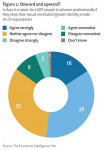Information governance strategies are lacking at most companies, global survey reveals
There are several reasons why proper information governance remains elusive, but the biggest challenge worldwide is identifying the cost/risk/return tradeoffs of managing information company-wide (40%). Enforcing policies company-wide (39%) and gaining support from department heads and line-of-business managers (35%) are also obstacles. And, of course, alterations to traditional business processes often result in cultural hurdles: “Getting several thousand people to change their work practices in a manner that doesn’t interfere with their needs is a big challenge,” says Peter Whatnall, CIO of Sunoco, a leading manufacturer and marketer of petroleum and petrochemical products.
More positively, 77% of respondents expect information governance to be important or very important to their company’s success over the next three years. As a result, many firms have begun building the foundation for information governance policies. Two-thirds have adopted policies regarding the manner in which information is to be stored and shared among employees and stakeholders. Furthermore, some organisations are setting up formal governance bodies to create strategies, policies and procedures surrounding the distribution of information inside and outside the firm. This is a good start, but considering that 68% of respondents also expect the complexity of their company’s information governance issues to grow over the next three years, there is little time to waste.
Other key findings from the survey include:
· Fewer than half of respondents report that their company’s organisational structure around information governance is not effective. Furthermore, 40% of respondents worldwide say that their firm does not regularly review and revise information backup and retention policies. When asked about managing the cost of collecting, storing and securing information throughout its lifecycle, 49% of respondents rate their firm’s ability in this area as sub-optimal.
· As a result, sharing data across a company remains difficult. Only 43% of respondents rate their firms’ ability to integrate and share information across departments and necessary third parties as good or very good; 21% say it is poor or very poor. This is particularly significant as it pertains to sharing customer information: 57% of respondents acknowledge they do not have a single view of the customer.
· Those that have a formal information governance strategy report significant benefits. More than 80% of firms with a formal information governance strategy in place report that “information can be better shared between departments, allowing for better decision-making”. Nearly half (47%) of respondents from these firms also say that “integrated information and business intelligence about our customers, products and resources can be leveraged for greater business results.”
· For firms without a governance strategy, the risks may be significant. Only 51% of respondents at companies that do not have a formal information governance strategy rate their firms’ overall ability to protect sensitive data as good or very good, compared with 85% for those whose companies have a formal strategy.
“Considering how important the strategic use of business information has become for companies around the world, it is clear that firms need to pay more attention to setting policies and carefully overseeing the use of corporate data,” says Debra D’Agostino, Deputy Director in the Americas, Industry and Management Research, at the Economist Intelligence Unit.
The future of enterprise information governance is available free of charge at: www.eiu.com/sponsor/emc/informationgovernance
About the survey
The survey, conducted by the Economist Intelligence Unit in April 2008, included responses from 192 business executives around the world. Thirty percent of survey respondents were located in North America, 30% in Western Europe, 30% in Asia-Pacific, and 10% from Latin America, the Middle East and Eastern Europe. Forty-four percent of respondents held C-level titles, and 46% hailed from companies with more than US$1bn in annual revenue. The survey included responses from a range of business functions and industries.
About the Economist Intelligence Unit
The Economist Intelligence Unit is the business information arm of The Economist Group, publisher of The Economist. Through our global network of more than 650 analysts and contributors, we continuously assess and forecast political, economic and business conditions in more than 200 countries. As the world's leading provider of country intelligence, we help executives make better business decisions by providing timely, reliable and impartial analysis on worldwide market trends and business strategies.
About EMC
EMC Corporation (NYSE: EMC) is the world’s leading developer and provider of information infrastructure technology and solutions that enable organizations of all sizes to transform the way they compete and create value from their information. Information about EMC’s products and services can be found at www.EMC.com.
웹사이트: http://www.eiu.com
연락처
Joanne McKenna
Press Liaison
Economist Intelligence Unit
26 Red Lion Square
London
WC1R 4HQ
UK
Direct: +44 (0) 20 7576 8188
Sales: +44 (0) 20 7576 8181
Switchboard: +44 (0) 20 7576 8000
email: 이메일 보내기
이 보도자료는 Economist Intelligence Unit가(이) 작성해 뉴스와이어 서비스를 통해 배포한 뉴스입니다.




